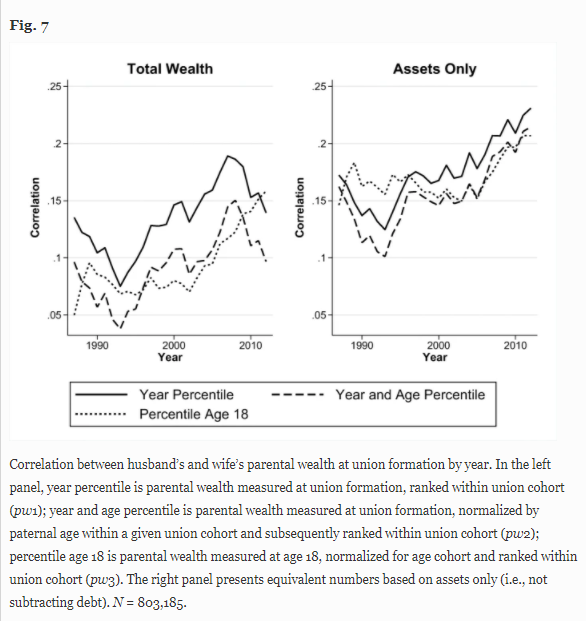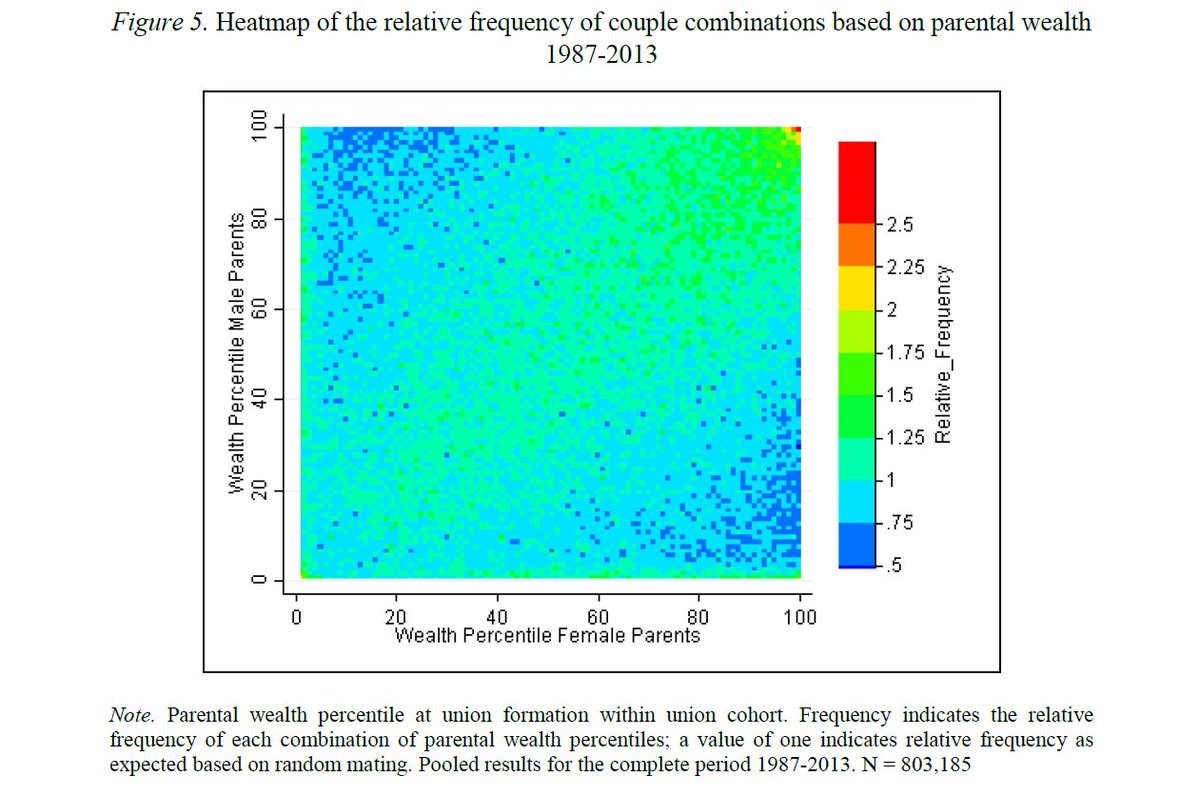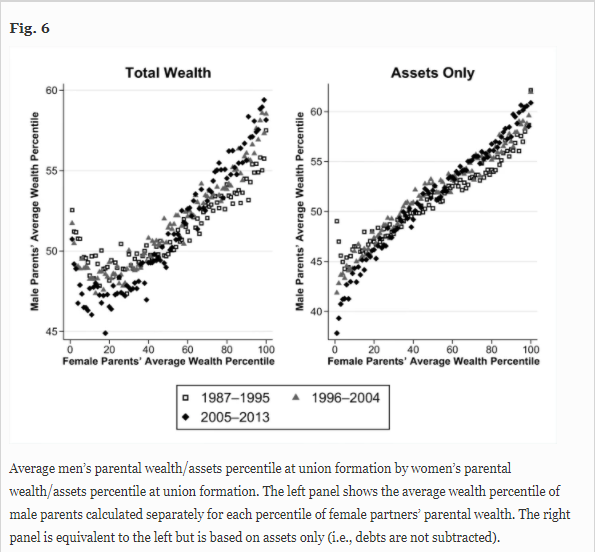"The Wealth of Parents" joint work with @DBoertien and @mettegoertz where we look at the evolution of homogamy in parental wealth (do children from rich families marry each other?) is out in Demography now https://link.springer.com/article/10.1007/s13524-020-00906-3">https://link.springer.com/article/1...  https://abs.twimg.com/emoji/v2/... draggable="false" alt="👇" title="Rückhand Zeigefinger nach unten" aria-label="Emoji: Rückhand Zeigefinger nach unten"> thread
https://abs.twimg.com/emoji/v2/... draggable="false" alt="👇" title="Rückhand Zeigefinger nach unten" aria-label="Emoji: Rückhand Zeigefinger nach unten"> thread
Using  https://abs.twimg.com/emoji/v2/... draggable="false" alt="🇩🇰" title="Flagge von Dänemark" aria-label="Emoji: Flagge von Dänemark">Registries allows us to link individuals to parents who give yearly wealth declarations. So we look at
https://abs.twimg.com/emoji/v2/... draggable="false" alt="🇩🇰" title="Flagge von Dänemark" aria-label="Emoji: Flagge von Dänemark">Registries allows us to link individuals to parents who give yearly wealth declarations. So we look at
1) When people form a couple how correlated is the wealth of their parents?
2) Does this change over time?
3) does homogamy change across the wealth distribution?
1) When people form a couple how correlated is the wealth of their parents?
2) Does this change over time?
3) does homogamy change across the wealth distribution?
What do we find?
1) parental wealth correlations in https://abs.twimg.com/emoji/v2/... draggable="false" alt="🇩🇰" title="Flagge von Dänemark" aria-label="Emoji: Flagge von Dänemark"> are between .5-1.5 this is much lower than for
https://abs.twimg.com/emoji/v2/... draggable="false" alt="🇩🇰" title="Flagge von Dänemark" aria-label="Emoji: Flagge von Dänemark"> are between .5-1.5 this is much lower than for  https://abs.twimg.com/emoji/v2/... draggable="false" alt="🇺🇸" title="Flagge der Vereinigten Staaten" aria-label="Emoji: Flagge der Vereinigten Staaten"> (where results are from self-declared survey data abt parental wealth)
https://abs.twimg.com/emoji/v2/... draggable="false" alt="🇺🇸" title="Flagge der Vereinigten Staaten" aria-label="Emoji: Flagge der Vereinigten Staaten"> (where results are from self-declared survey data abt parental wealth)
2) across different ways of measuring parental wealth, homogamy increases over time
1) parental wealth correlations in
2) across different ways of measuring parental wealth, homogamy increases over time
Further we find that children with parents in the top 10% and even more in the top 1% (red upper corner in heat map) have considerably higher degress of homogamy than the rest of the population. If you think about intergenerational capital reproduction this really matters
here you can see what is the average parental wealth percentile of men women in each percentile marry (sounds technical).
But what you can notice is that the relationship gets steeper in later times, indicating again that homogamy by parental wealth is increasing over time
But what you can notice is that the relationship gets steeper in later times, indicating again that homogamy by parental wealth is increasing over time
a technical note!
The way wealth is normally calculated is: assets-liabilities.
We believe that using only assets is probably a better indicator of social status. Correlations get stronger and weird effects at the bottom of the distributions disappear (see graphs).
The way wealth is normally calculated is: assets-liabilities.
We believe that using only assets is probably a better indicator of social status. Correlations get stronger and weird effects at the bottom of the distributions disappear (see graphs).
the intuition here is that people with the capacity to seriously indebt themselves are not that bad off in many ways. But this is a point to be made more in-depth in another paper.

 Read on Twitter
Read on Twitter are between .5-1.5 this is much lower than for https://abs.twimg.com/emoji/v2/... draggable="false" alt="🇺🇸" title="Flagge der Vereinigten Staaten" aria-label="Emoji: Flagge der Vereinigten Staaten"> (where results are from self-declared survey data abt parental wealth)2) across different ways of measuring parental wealth, homogamy increases over time" title="What do we find?1) parental wealth correlations in https://abs.twimg.com/emoji/v2/... draggable="false" alt="🇩🇰" title="Flagge von Dänemark" aria-label="Emoji: Flagge von Dänemark"> are between .5-1.5 this is much lower than for https://abs.twimg.com/emoji/v2/... draggable="false" alt="🇺🇸" title="Flagge der Vereinigten Staaten" aria-label="Emoji: Flagge der Vereinigten Staaten"> (where results are from self-declared survey data abt parental wealth)2) across different ways of measuring parental wealth, homogamy increases over time" class="img-responsive" style="max-width:100%;"/>
are between .5-1.5 this is much lower than for https://abs.twimg.com/emoji/v2/... draggable="false" alt="🇺🇸" title="Flagge der Vereinigten Staaten" aria-label="Emoji: Flagge der Vereinigten Staaten"> (where results are from self-declared survey data abt parental wealth)2) across different ways of measuring parental wealth, homogamy increases over time" title="What do we find?1) parental wealth correlations in https://abs.twimg.com/emoji/v2/... draggable="false" alt="🇩🇰" title="Flagge von Dänemark" aria-label="Emoji: Flagge von Dänemark"> are between .5-1.5 this is much lower than for https://abs.twimg.com/emoji/v2/... draggable="false" alt="🇺🇸" title="Flagge der Vereinigten Staaten" aria-label="Emoji: Flagge der Vereinigten Staaten"> (where results are from self-declared survey data abt parental wealth)2) across different ways of measuring parental wealth, homogamy increases over time" class="img-responsive" style="max-width:100%;"/>




